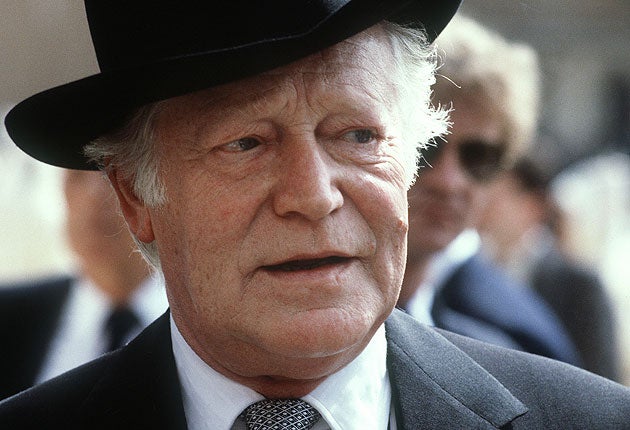Maurice Druon: Writer and pugnacious defender of the French language

Few people can have packed so much into 90 years as the French novelist Maurice Druon. As a young man, he was a follower of Charles de Gaulle; in his old age, he was a friend of Vladimir Putin. He was an acquaintance of Antoine de Saint Exupery; he was a novelist, a playwright, a war correspondent, the minister of culture and the perpetual secretary of the Académie française, who fought unsuccessfully to keep women out of France's exclusive literary club.
Druon, the illegitimate son of a Russian-Jewish actor, was best known in his later years as a defender of the purity of the French language (amongst other lost causes). Despite his vociferous defence of French, he kept from his wartime experiences on De Gaulle's staff in London an uncompromising love of Britain and of the English language. In his 80s, he wrote essays arguing that the global spread of approximate English was not just a menace to the "language of Molière". It also threatened to destroy the beauty of the "language of Shakespeare".
Although a passionate conservative, obsessed with the dangers of cultural decline, Druon was not utterly blind to modernity. He praised the "poetry" of the French rapper MC Solaar and created an internet site for the Académie, the institution which has defended the French language, and its own prerogatives, since the late-17th century.
Maurice Druon's best-known achievement for De Gaulle's Free French was to have written in 1943, jointly with his uncle Joseph Kessel, the words of the "Chant des Partisans", the would-be "La Marseillaise" of the French Resistance movement ("Friend, do you hear the flight of the black crows over our plains?"). The song was frequently broadcast to France by the BBC during the war and has been recorded since by, amongst others, Johnny Hallyday.
Historians diverge on how far the song ever became a popular ditty with the soldiers of the Maquis, but the whispering of its first words "Amis, entends-tu" became an unofficial password of the Resistance in 1943-44.
As a successful post-war literary figure, Druon's best known work was the six volumes of Les Rois Maudits, a saga of the poisonous, political and romantic intrigues at the French and English courts just before the Hundred Years' War. Like the 19th century historical novelist Alexandre Dumas, Druon was partially the author and partially the editor, using a "workshop" of writers to pen the mammoth series from 1955 to 1960. Unlike Dumas, Druon gave generous credit to the others' efforts.
Les Rois Maudits (The Accursed Kings) was one of the few works of contemporary western literature to be published in Russian in the Soviet Union in the 1960s. Thus, the playful, arch-conservative Maurice Druon, not the dour and radical Jean-Paul Sartre or Albert Camus, became the voice of France to Russian bibliophiles, including the young Vladimir Putin.
When Putin became president of Russia, he started an unlikely friendship with his literary hero, breaking off from a state visit to France in 2003 to see Druon in his home near Bordeaux, and visiting the ailing writer once again in his Paris flat in May last year.
Druon was born in Paris on 23 April 1918. His father, Lazare Kessel, a Russian-born actor, committed suicide when Maurice was two years old. His mother, also an actor, married a Norman notary, René Druon de Reyniac, who adopted him when he was seven.
Much influenced by his literary uncles, Joseph and Jef Kessel, Druon became convinced as a young man that cultural decline began with linguistic decline. "Anarchy is as detestable in grammar as it is in society," he once said. In his brief career as minister of culture (1973-74), he campaigned against "subversive" art. Playwrights seeking government subsidies should, he said, not approach his ministry with "a begging bowl in one hand and a Molotov cocktail in the other".
As perpetual secretary of the Académie française from 1985 to 1999, he was at the forefront of battles to save French from Anglicism, neologisms and revised spelling. He also defended the Académie's tradition of interminable labour on its never-finished dictionary. Asked in television interviews how the dictionary was going, he would say with a smile: "Ça progresse, ça progresse".
In 1980, before he became the academy secretary, he fought a vituperative battle to prevent the novelist Marguerite Yourcenar from becoming the first woman to wear the traditional green uniform of France's literary warriors. If she were elected, he claimed, the academy would fill up with women "doing their knitting".
Druon, who never married, lost the battle and even came to support other female candidates. He handed over the secretaryship to one of them, Hélène Carrère d'Encausse, in 1999.
Pugnacious, but charming, to the end, Druon fought another high profile battle in 2003. He was determined to keep the former President Valéry Giscard d'Estaing out of the academy. Druon had never forgiven Giscard, or Jacques Chirac, for destroying the old Gaullist movement in 1974. He described Giscard d'Estaing as a "Brutus, without the greatness, but with the vanity." It was Druon's last battle and, needless to say, he lost it.
John Lichfield
Maurice Druon, writer and president of the Académie française: born Paris 23 April 1918; died Paris 14 April 2009.
Join our commenting forum
Join thought-provoking conversations, follow other Independent readers and see their replies
Comments
Bookmark popover
Removed from bookmarks